Rwanda recognizes air pollution in cities and at the national level as a serious environmental and health threat. The World Health Organisation (WHO) estimates that seven million people die prematurely from exposure to air pollution each year. Rwanda has also felt the impacts of air pollution with over 2000 respiratory disease-related deaths in 2012.
The COVID-19 lockdown-caused has caused a drop in air pollution and a return to blue skies, showing a clear link between human activities and air pollution. Air pollution in Kigali decreased significantly as people stayed home during the national lockdown.
Rwanda is holding a national virtual seminar to celebrate the first International Day of Clean Air for blue skies. A joint inspection of vehicles and industries is also organized, as are exhibitions and media campaigns.
A key goal of the day is to raise awareness of the sources and impacts of air pollution and the joint efforts and innovation being carried to improve air quality and protect human health. The country will also use the day to demonstrate the close link between air pollution and climate change and highlight Rwanda`s actions to fulfil the commitments in its National Determined Contributions (NDCs) and achieve sustainable development.
In her address ahead of this important day, Dr. Jeanne D’Arc MUJAWAMARIYA the Minister of Environment emphasized the need for global citizens to recognize that poor air quality in cities and at the national level is a problem. “I continue to encourage global citizens to use public transport, use clean energy at home and plant a tree whenever the opportunity arises,” she said.
The Government of Rwanda and its partners have taken significant strides to identify air pollution sources and improve national air quality monitoring, particularly in Kigali, the capital city.
Eight air pollution monitors were installed in provinces around the country and real-time air quality data is provided through an online air quality management system. An air quality reference station was also installed in Kigali City. Rwanda Environment Management Authority (REMA) and the Ministry of Education is responsible for putting in place and sustaining the monitoring network using funding from the Rwanda Green Fund.
Rwanda is also moving to electrify its vehicle fleet. In 2018, electric motorcycles and electric cars were introduced to the Rwandan market as part of clean transport through e-mobility initiatives. Two electric motorcycle companies are now registered to operate in Rwanda. In the same year, a pilot project saw the first electric vehicles -- called E-Golfs -- arrive in Rwanda through a partnership between Volkswagen and Siemens.
In addition to e-mobility, the Government is investing heavily in renewable energy production, in particular hydropower plants, methane gas power plants and solar power systems.
To limit vehicle air pollution the Kigali City Council introduced Kigali Car Free Days twice a month. Car-free days take place once a month in other cities. Studies have shown that concentrations of fine particulate (PM2.5) and particulate (PM10) matter near car-free roads fall by approximately 50% on car-free days.
Rubingisa Prudence, Kigali’s Mayor, says that approximately 6,000 Rwandans participate in the car-free day package and the spillover effect in regard to air quality does not go unnoticed. “Taking it a step further, we are working with local government to drive similar initiatives at sector and cell level.”
The Government of Rwanda’s commitment to preserving air quality and fighting air pollution has also led to the adoption of laws and regulations. The 2016 Air Quality Law sets the framework for regulation and the prevention of air pollution in Rwanda. This law mandates REMA to regulate air quality and to improve the health and well-being of the people. REMA must report on the status of air quality in Rwanda and on strategies to address air pollution. The law has been further supplemented by the Law on Environment and new 2019 National Policy on Environment and Climate Change. Rwanda Standards Board has also developed national air, vehicle and industrial emissions standards.
Through Rwanda its NDC, Rwanda is committed to build extensive and affordable public transport networks and increase progress toward electric mobility. Implementation of the Environment and Climate Change (E&CC) policy actions aligned with Rwanda’s Vision 2050 also remains a priority.
This story was submitted by the Ministry of Environment in the Government of Rwanda. Non-UNEP stories highlighted here have been communicated to the United Nations Environment Programme (UNEP) by external partners in support of the International Day of Clean Air for blue skies and are shared here as a courtesy. UNEP is not responsible for the content. Inclusion here is not meant to be construed as an endorsement of the stories or the content therein.
